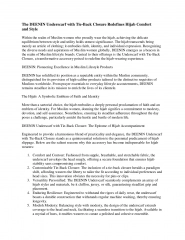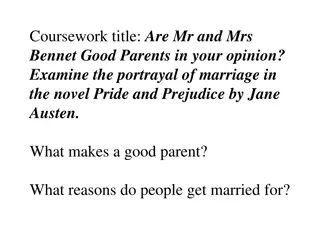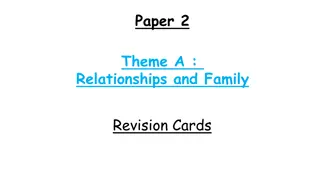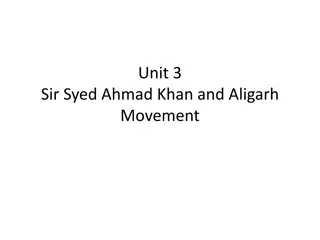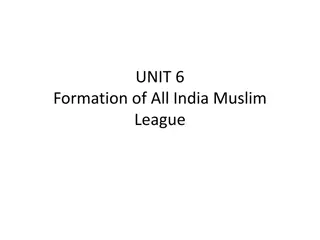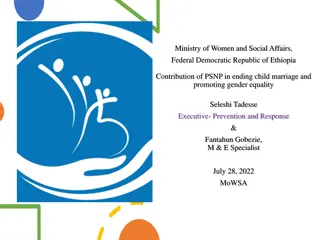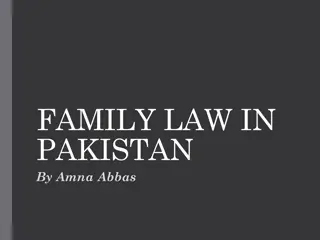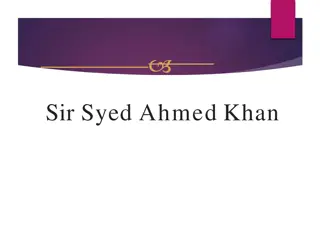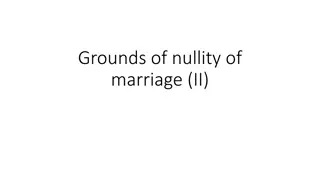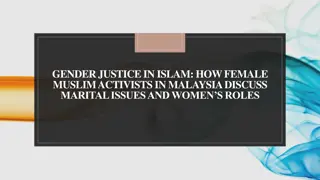Essentials of Muslim Marriage and Nikah: A Comprehensive Overview
During pre-Islamic times, women were marginalized but Islam elevated their status through Nikah, a civil contract for marriage. The essentials of Nikah include competency of parties, free consent, formalities, and absence of prohibitions. Factors such as age of puberty, soundness of mind, and religion of parties play crucial roles in Muslim marriages. Consent must be freely given, without coercion or fraud. Understanding these essentials is vital for a successful Muslim marriage.
Download Presentation

Please find below an Image/Link to download the presentation.
The content on the website is provided AS IS for your information and personal use only. It may not be sold, licensed, or shared on other websites without obtaining consent from the author. Download presentation by click this link. If you encounter any issues during the download, it is possible that the publisher has removed the file from their server.
E N D
Presentation Transcript
ESSENTIALS OF MUSLIM MARRIAGE PRESENTED BY, PRIYA.TK, 1STYEAR LL.B, BMS COLLEGE OF LAW, BANGALORE
INTRODUCTION During the Pre-Islamic times, the position of women in the society was very dreadful. They were treated as chattels and not as human beings. The only objective of marriage was only the enjoyment of sex and limitless polygamy was into existence There was no restriction in marriage on prohibited degree of relationship. When Islam came into existence, the females were given dignified status. Islam prescribed a definite form of marriage namely Nikah .
NIKAH Nikah is an Arabic term which is used in Quran and refers to Marriage. In landmark case Abdul Kadir v. Salima And Anr, It was held that Muslim marriage is purely a civil contract and not a sacrament. Muslim marriage can be compared to a contract but not a pure civil contract because it has socio, religious aspects. Hence the objective of Muslim marriage is to legalize sexual intercourse and procreation of children.
ESSENTIALS OF NIKAH Competency of parties 1. Free consent of the parties 2. Formalities in the marriage 3. Absence of prohibitions 4.
1. COMPETENCY OF PARTIES A. Age of puberty For the purpose of Muslim marriage, the age of the puberty is taken into consideration.. Age of puberty is 15 years generally or on attainting puberty which ever is earlier. Puberty is essential for consummation of marriage and to give consent. Minors marriage is valid only with consent of guardian B. Soundness of mind At the time of marriage parties must be of sound mind Persons of unsound mind (i) Idiocy-abnormal state of mind hence incompetent to enter the marriage contract, (ii) Lunacy- Curable disease hence has competency. C. Religion of parties The parties to marriage should be of Muslim only irrespective of their sect or sub sect Though marriage is considered to be inter sect but both the parties should be of Muslim NON-MUSLIMS: SUNNI S IRREGULAR SHIAS VOID AB INITIO KITABIA FEMALE : SUNNI S VALID
2. FREE CONSENT OF PARTIES Compulsion A. To constitute a valid marriage, the consent of the arties must be free. If the consent is obtained by force, threat, coercion it is void under both Sunnis and Shias except the Hanafis. Fraud B. By dishonestly hiding of relevant facts to obtain the consent. This is voidable in nature, the parties to the marriage can approve or reject the same. Mistake of fact C. Mistake of identity, nature or relevant fact in obtaining the consent to the marriage is void. In the case of Abdul Ahad vs. Shah Begum, The court held that, minors marriage without 1. consent of guardian is void.. In the case of Mohiuddin vs. Khatijabab, The court held that, a marriage is invalid if it is 2. held without free consent of the parties.
3. FORMALITIES IN THE MARRIAGE Offer and Acceptance A. Offer (Ijab) and Acceptance(Qubul) should be made by the parties at the same sitting. Can be made via phone, video conference, Skype Witness and attorneys should be present at the meeting. B. Reciprocity Acceptance should be made for the proposal without any modifications and contingencies C. Presence of witness 2 male/1male and 2 female witnesses who are of sound mind, major(age of puberty) should be present SUNNI S : NO WITNESS/ INCOMPETENT WITNESS = IRREGULAR SHIAS : NO WITNESS REQUIRED D. Registration Muslim law does not require registration of marriage In Jainoon vs. amanullah khan For proof of the marriage, community can develop registration which may become custom.
4. PROHIBITIONS Absolute prohibition 1. Consanguinity (Qurbat) - It means blood relationship like mother, grandmother, sister. Affinity (Mushaarat) - A man is prohibited from marrying his wife s mother or grand mother, his wife s daughter and grand daughter, wife of his father or grand father and wife of his son or son s son. Fosterage (Riza) A child under the age of 2 years suckled by a women other than his mother becomes her foster child hence the man is prohibited from marrying his foster mother, sister etc
2. Relative prohibition It is the prohibition which bars the marriage only for a particular duration, once the causes of this prohibitions are removed the marriage becomes valid The following are the cases of relative prohibition : Unlawful conjunction Marrying a fifth wife Absence of proper witnesses Differences of religion Woman undergoing Iddat
Prohibitive prohibition 3. It arises in the following cases : Polyandry 1. Muslim women marrying a non Muslim 2. 4. Directory prohibition It arises from: Marrying a pregnant women 1. Marrying during pilgrimage 2. Marriage with a sick man 3.
CONCLUSION Thus under Muslim law, marriage is just a contract which validates the sexual relationship between the parties for the procreation of children It is said to constitute to be valid marriage only after fulfilling certain formalities .









